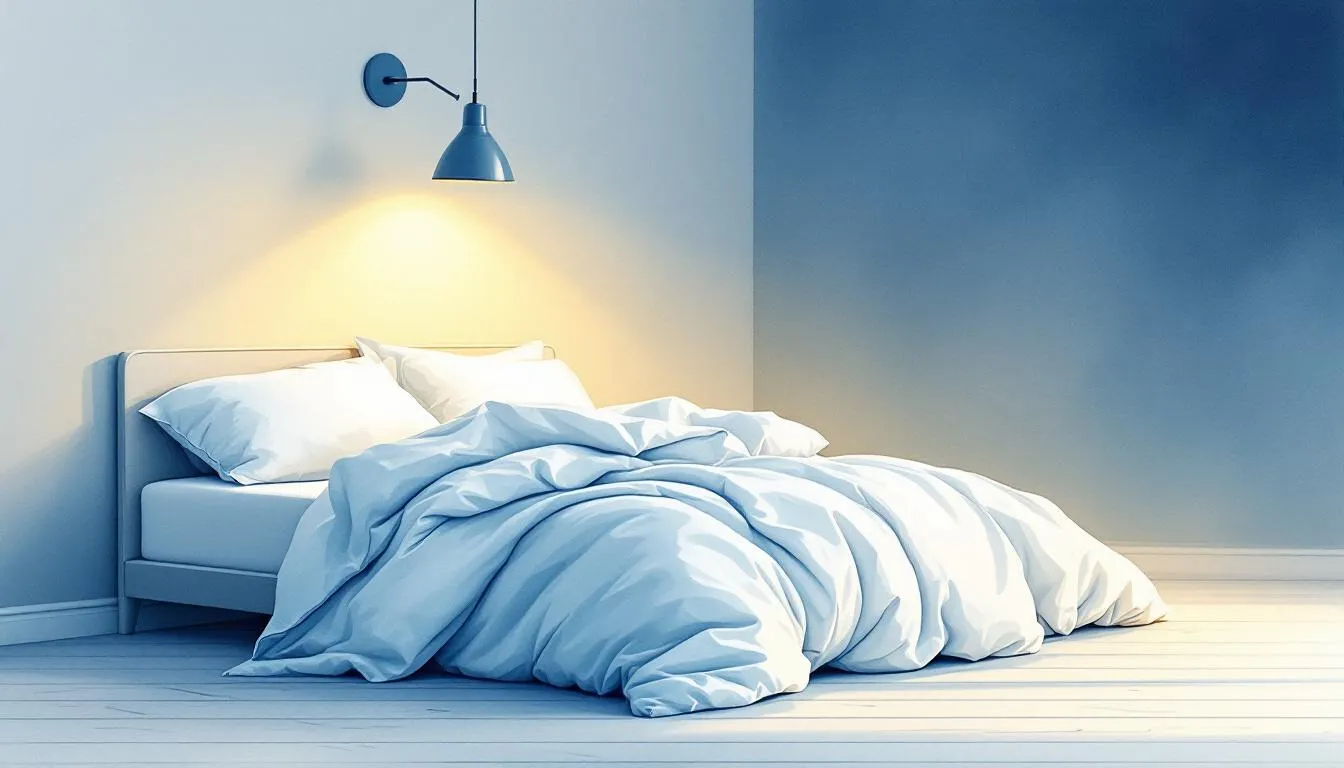Top Evening Habits for Sleeping Better: Practical Tips You Need
Want to sleep better at night? This guide is designed…
Want to sleep better at night? This guide is designed to help you achieve a better night’s sleep by sharing proven strategies and habits. From setting a consistent bedtime to regulating your evening diet, these steps can transform your sleep quality. Read on for practical tips that can make a real difference.
Introduction to Better Sleep
Getting a good night’s sleep is more than just a luxury—it’s a necessity for your overall health and well-being. Quality sleep allows your body to repair itself, boost your immune system, and recharge your mind for the day ahead. If you’re looking to improve sleep, focusing on your evening routine and developing good sleep habits can make a world of difference. Simple changes, like sticking to a regular sleep schedule and limiting the use of electronic devices before bedtime, can help you fall asleep faster and wake up feeling refreshed. By prioritizing healthy sleep and making small adjustments to your nightly habits, you’ll set yourself up for better sleep and more energized mornings.
Key Takeaways
- Establish a consistent bedtime routine to regulate your sleep schedule and enhance sleep quality.
- Create a sleep-friendly environment by keeping your room cool, dark, and quiet to minimize disturbances.
- Limit screen time and engage in relaxing activities before bed to promote better sleep hygiene and promote good sleep.
Understanding Sleep Hygiene
Sleep hygiene is all about creating the best possible conditions for a restful night’s sleep. Practicing good sleep hygiene means sticking to a consistent sleep schedule, making your bedroom a calm and comfortable space, and avoiding stimulating activities before bedtime. For example, keeping your room dark, quiet, and cool can help your body relax and prepare for sleep. Exposure to blue light from electronic devices, like phones and tablets, can delay sleep onset, so it’s best to put them away as part of your bedtime routine. Activities such as reading a book or taking a warm bath can signal to your body that it’s time to wind down. By focusing on good sleep hygiene, you’ll improve your sleep quality and wake up feeling more alert and ready to take on the day.
Establish a Consistent Bedtime Routine

Consistency is key when it comes to sleep. Maintaining a regular sleep schedule, where you go to bed and wake up at the same time every day, helps train your body’s natural circadian rhythm. This regularity can significantly improve your sleep quality, making it easier to fall asleep faster and wake up refreshed. A consistent bedtime routine signals to your brain that it’s time to wind down, promoting better sleep onset and deeper, more restorative sleep. Additionally, paying attention to your wake up time can enhance your overall sleep experience. Consider how much sleep you need and plan your bedtime accordingly to ensure you meet your sleep goals.
A nightly routine helps regulate your body’s internal clock and encourages the production of melatonin, the hormone responsible for promoting sleep. Whether it’s reading a book, practicing relaxation techniques, or simply dimming the lights, engaging in the same order of activities every night can enhance your sleep hygiene, good sleep habits, and overall sleep quality, improving sleep.
The Importance of Circadian Rhythm
Your circadian rhythm is your body’s natural clock, guiding you through cycles of sleep and wakefulness every 24 hours. This internal rhythm is influenced by light and darkness, helping your body know when it’s time to sleep and when it’s time to wake up. When your circadian rhythm is in sync, you’re more likely to enjoy deep, restorative sleep and feel energized during the day. However, disruptions—like irregular sleep schedules or exposure to bright lights at night—can lead to trouble sleeping and impact your sleep quality. To support a healthy circadian rhythm, try to get natural sunlight during the day, keep your evenings dim, and stick to a regular bedtime and wake time. These habits help your body maintain a balanced sleep-wake cycle, making it easier to fall asleep and wake up feeling refreshed.
Wind Down with Relaxing Activities
As the day winds down, so should you. Engaging in calming activities before going to bed can create a smooth transition from wakefulness to sleep. Activities such as:
- reading a book
- taking a warm bath
- journaling can help relax your mind and body, making it easier to fall asleep. These activities don’t just serve as distractions; they actively prepare your body for rest by promoting relaxation and reducing stress.
Personal preferences play a significant role in the effectiveness of your wind-down routine. For some, activities that can be incredibly beneficial include:
- Listening to soothing music
- Guided meditation
- Completing puzzles
- Engaging in deep breathing exercises
The key is to find what works best for you and incorporate it into your nightly routine. This creates a personalized path to a good night’s sleep.
Mind Your Evening Diet
Your evening diet can significantly impact your sleep quality. Caffeine and nicotine, for instance, are stimulants that can interfere with your ability to fall asleep. Energy drinks, which are high in caffeine and sugar, should also be avoided before bed as they can disrupt your sleep patterns. It’s advisable to avoid these substances, as well as large meals, at least three hours before bed to prevent disruptions in your sleep cycle. These simple tips can significantly improve your ability to fall asleep faster and enjoy a good night’s rest.
Consider the following to reduce discomfort such as heartburn or indigestion during the night:
- Opt for lighter meals
- Sip on herbal teas like chamomile, known for their calming properties
- Avoid alcohol
- Avoid heavy, spicy, or acidic foods
It’s also important not to go to bed hungry, as being bed hungry can make it harder to fall asleep. If needed, have a light snack to calm your stomach and promote restful sleep.
Being mindful of your evening routine diet paves the way for a healthy sleep routine and a good night’s sleep while also promoting sleeping habits, ensuring you get enough sleep for a good night’s rest and deep sleep, contributing to well being and a good night’s. Poor sleep and unhealthy evening diets can also increase the risk of health issues such as heart disease.
Create a Sleep-Friendly Environment

Your sleep environment plays a crucial role in determining the quality sleep of your sleep. A cool, dark, and quiet room can significantly enhance your ability to fall asleep and stay asleep throughout the night. Specifically:
- A cool bedroom helps regulate your body temperature, promoting better sleep quality.
- A dark room minimizes light disturbances.
- A quiet room reduces noise disruptions.
Consider using room-darkening shades and blackout curtains to block out any unwanted light, along with earplugs or white noise machines to minimize disruptive ambient sounds. These adjustments might seem minor, but they can make a world of difference in creating a sleep-friendly environment that supports a good night’s rest. Paying attention to these environmental factors is essential for ensuring a truly restful night’s rest.
Limit Screen Time Before Bed

The blue light emitted by screens can be a major culprit in disrupting your sleep. This light interferes with the production of melatonin, the hormone that regulates sleep patterns, making it harder to fall asleep. Research shows that using electronic devices close to bedtime is linked to poorer sleep quality and longer sleep onset.
Limiting screen time at least two hours before bed promotes good sleep hygiene. Instead of scrolling through your phone or watching TV, consider engaging in calming activities like reading a book or practicing relaxation techniques. These practices can help you unwind and prepare your body for a restful night’s sleep, ideally aiming for at least seven hours.
Incorporate Light Physical Activity
Light physical activity before bed can work wonders for your sleep quality. Activities such as:
- stretching
- yoga
- a short walk can help reduce stress and signal to your body that it’s time to wind down. These gentle exercises promote relaxation and can make falling asleep easier.
Exercising earlier in the day is especially beneficial, as the timing of exercising can impact sleep quality. Scheduling workouts in the morning or afternoon helps your body wind down naturally at night, while exercising too close to bedtime may be stimulating for some people.
However, it’s important to avoid high-intensity workouts close to bedtime, as they can be too stimulating and interfere with your ability to fall asleep. Instead, focus on calming activities that help ease tension and prepare your body for a good night’s rest through gentle exercise.
Address Stress and Anxiety
Stress and anxiety are common culprits behind sleepless nights and trouble sleeping. Practicing relaxation techniques such as guided meditation or mindfulness can help manage these feelings. Guided meditation involves visualizing calming images and can effectively alleviate daily de stress, promoting a sense of calm before bed.
Another effective method is journaling or writing a to-do list for the next day. This practice can help clear your racing mind, reducing pre-sleep anxiety and making it easier to fall asleep. Addressing stress and anxiety can improve your sleep environment and overall mental health.
Avoid Naps Late in the Day
While naps can be refreshing, taking them too late in the day can negatively impact your ability to sleep at night. Napping after 3 p.m. can interfere with your sleep-wake cycle, making it harder to fall asleep and stay asleep. This disruption can lead to difficulty falling asleep and a restless night.
If you need to nap, try to keep it short—no longer than one hour—and earlier in the day. This approach can help you feel rejuvenated without compromising your nighttime sleep quality. Managing nap times promotes better sleep habits and a healthier sleep schedule.
Stay Hydrated, But Not Too Much
Staying hydrated is essential for overall health, but drinking too much water before bed can lead to frequent trips to the bathroom, disrupting your sleep. To avoid this, it’s recommended to reduce fluid intake in the hour or two leading up to bedtime.
Adjusting your evening liquid consumption prevents interruptions to your sleep cycle while keeping your body hydrated. Striking the right balance in hydration supports bodily functions and promotes healthy sleep without causing nighttime disruptions.
Set Up a Sleep-Inducing Ritual

Creating a sleep-inducing ritual can signal to your body and mind that it’s time to wind down. Engaging in activities like taking a warm bath or shower can relax your muscles and lower your body temperature, preparing you for sleep. These rituals can enhance relaxation and improve sleep quality.
Listening to calming music, using aromatherapy with scents like lavender, or sipping on herbal teas can also be part of your nightly routine. However, scientific data on the effectiveness of scents like lavender for sleep improvement is limited or inconclusive. Consistently following your wind-down ritual each night can significantly improve your ability to help you fall asleep and enjoy a restful night’s sleep.
Overcoming Sleep Obstacles
Even with the best intentions, many people face obstacles that can make falling asleep or staying asleep a challenge. If you find your mind racing with thoughts at night, try keeping a notepad by your bed to jot down worries or to-do lists, helping to clear your mind before sleep. For those who work irregular hours or shifts, maintaining a consistent sleep schedule—even on days off—can help regulate your body’s internal clock. Environmental factors, like noisy neighbors or streetlights, can also disrupt sleep; using blackout curtains, earplugs, or a white noise machine can help create a more peaceful sleep environment. If you’re still having trouble sleeping despite these efforts, consider relaxation techniques such as deep breathing exercises or guided meditation to calm your body and mind. By addressing these common sleep obstacles, you’ll be better equipped to enjoy a good night’s rest and improve your overall sleep quality.
Seek Professional Help if Needed
If sleep problems persist and begin to disrupt daily activities or cause significant distress, it may be time to consult a healthcare provider. Persistent waking, mood changes, and trouble concentrating can leave you feel tired and are common signs that you might need professional help with sleep debt.
Insomnia, characterized by trouble falling asleep or staying asleep, can have negative effects on overall health and may require professional assessment. Seeking professional advice can help address underlying issues and provide solutions for better sleep.
Summary
Incorporating these evening habits into your daily routine can significantly improve your sleep quality. From establishing a consistent bedtime routine to managing your evening diet and creating a sleep-friendly environment, these practical tips are designed to help you achieve a better night’s sleep.
Remember, prioritizing sleep is essential for overall well-being. By making these changes, you can enjoy restful nights and wake up feeling refreshed and ready to take on the day. Sweet dreams!
Frequently Asked Questions
How can I establish a consistent bedtime routine?
To establish a consistent bedtime routine, try going to bed and waking up at the same time every day, as this helps regulate your body’s internal clock. It’s a simple change that can lead to more refreshing sleep!
What are some relaxing activities to do before bed?
Reading a book, enjoying a warm bath, journaling, or listening to calming music can really help you unwind before bed. Try incorporating one of these into your nightly routine for a more restful sleep.
What foods should I avoid before bedtime?
To get a good night’s sleep, steer clear of caffeine, nicotine, heavy meals, and spicy or acidic foods right before bedtime. Making these small changes can really help improve your sleep quality!
How can I create a sleep-friendly environment?
Creating a sleep-friendly environment is all about keeping your bedroom cool, dark, and quiet. Consider using room-darkening shades, earplugs, or a white noise machine to help improve the quality of your sleep.
When should I seek professional help for sleep issues?
You should seek professional help if your sleep issues are disrupting your daily life or causing you significant distress. It’s important to prioritize your well-being and get the support you need.






